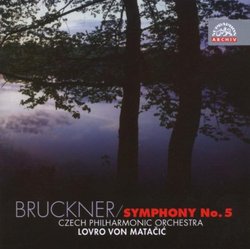| All Artists: Anton Bruckner, Lovro von Matacic, Czech Philharmonic Orchestra Title: Bruckner: Symphony No. 5 Members Wishing: 0 Total Copies: 0 Label: Supraphon Original Release Date: 1/1/2007 Re-Release Date: 4/24/2007 Album Type: Import Genre: Classical Style: Symphonies Number of Discs: 1 SwapaCD Credits: 1 UPC: 099925390327 |
Search - Anton Bruckner, Lovro von Matacic, Czech Philharmonic Orchestra :: Bruckner: Symphony No. 5
 | Anton Bruckner, Lovro von Matacic, Czech Philharmonic Orchestra Bruckner: Symphony No. 5 Genre: Classical |
Larger Image |
CD Details |
CD ReviewsRemembering An Older World... Douglas S. Halfen | Baltimore, MD, USA | 09/03/2007 (4 out of 5 stars) "I completely agree with Johan's comments. I would just like to emphasize that hearing the "original" (as opposed to "original original") versions of Bruckner's symphonies is like seeing pictures of friends from long before you knew them. Some people stay remarkably the same througout life, while others go through numerous changes and phases. Here, we have Bruckner's 5th, one of the absolute pinnacles of symphonic literature, "going through a phase." Specifically, the climax of the finale is doing its best impression of the closing to Mahler's 8th symphony --- you know, planets spinning so mightily that you can hear their vibrations, brass sounding from on high, heaven's light drowning the room... Well, actually, that _is_ essentially what happens at the end of the 5th, anyway, but all of these elements are just _emphasized_ ever-so-theatrically (my goodness, just listen to those winds swoop and soar!). I can imagine how audiences (and conductors) long-accustomed to these elements might be loathe to surrender them. Matacic also includes these theatrics in his recording with the NHKSO (the audience certainly gobbles it up), but he loses (most of) them by the time of his French National Orchestra performance in 1979. He's also very quick, a little _too_ fast for my taste (Furtwängler, anyone?). For a first choice, I'd heartily recommend Barenboim's recording with the Berliners -- it's my personal favourite, hands-down (perfect tempi, near-perfect recording, near-flawless performance). For a fascinating side-take, this recording will certainly illustrate history for you." Somewhat disappointing L. Johan Modée | Earth | 04/24/2007 (3 out of 5 stars) "Lovro von Matacic's recording of Bruckner's seventh symphony (Supraphon) has for long been one of my favourite recordings of that work. His recording of the third symphony (BBC Legends) is also a very fine recording. By contrast, the present recording is somewhat disappointing. My main complaint is that von Matacic adds cymbal crashes and extra brass in the final bars - crashes that that is absent from Haas' "original version". Despite that, the text in the booklet claims that von Matacic performs Haas' version. But in fact, comparing with Knappertbusch's version (Music & Arts), it seems that von Matacic here follows Schalk's version, as Kna also does, which adds both brass and cymbal crashes in the finale. Elsewhere, however, he seems to follow Haas' version. Even if the Schalk version is interesting as such, it is clearly inferior to the 1935 Haas "original version". Another complaint concerns the recording quality. While Supraphon's recordings from the late fifties and sixties often are quite outstanding, this 1970 recording is less technically successful, lacking both atmosphere and dynamic range. Thus, I would not recommend this recording as a first choice. So look instead for some of the greatest recordings of the fifth, which, in my view, are Abendroth's (Berlin Classics) Jochum's (DG and Philips), Klemperer's (EMI) and Horenstein's (BBC Legends). " A free-spirited, sometimes brash reading that's very refresh Santa Fe Listener | Santa Fe, NM USA | 05/14/2009 (5 out of 5 stars) "A Bruckner symphony from the Czech Phil. is a curiosity, and I'm sorry that the previous reviewers have nothing to say about this performance from 1970 that is either cogent or musical. The whole issue when an outsider orchestra tries something new is whether they add a fresh interpretation one wouldn't get from the mainstream (Viennese, Berliner) tradition.
In this case, the Czechs are delightfully different, and the fact that they add lightness and freshness to Bruckner's most problematic symphony is doubly intriguing. Despite his aristocratic-sounding German name, von Matacic was Croatian, born in 1899, and an anti-Nazi war hero in his native land. I know of him mostly from opera recordings for EMI in the Fifties -- he leads a classic Merry Widow with Schwarzkopf in one of her stellar portrayals -- but Wikipedia informs us that he was closely associated with Bruckner's music. It shows here -- the pacing and dramatic organization are quite assured. In keeping with the Czech Phil's lighter, more bucolic sound, von Matacic doesn't try to overwhelm us in a tide of brass and strings. Bruckner's climaxes are strong and surging, but what's most memorable are the chuckling Czech woodwinds and an overall lack of pretension: this is Bruckner released from the cathedral to bask in the sun. Hovering around 70 min., it is also a fast-paced Bruckner Fifth, vying to win the race with Welser-Most on EMI. Matacic is emotionally warmer and more "positive," to use a Britishism. Because attacks are often brash and punchy, this reading feels rough and ready at times, but that only adds to the sense of a free spirit gamboling through the thickets. This is the only Fifth I've heard where the brass chorales don't remind me of church. The slow movement, far from being solemn, is full of natural exuberance. If that's an appealing prospect to you, von Matacic's account is definitely one to experience." |
